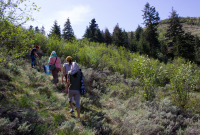Thank you for helping us meet our fundraising goal!
When people know and trust each other, shared delight, mutual purpose, tolerance, and productive social discourse follow. This is true even when we inevitably have moments of disagreement.
But in Canada, as in most developed countries, our social institutions are fraying, relationships are becoming more transactional and intermittent, and interpersonal support systems are weakening. According to Community Foundations of Canada’s most recent Vital Signs report, 29 per cent of people do not have close friends in their community. People who have experienced discrimination are 2.75 times more likely than those who feel they have someone they can depend on. And too often, our society erects barriers to belonging for seniors, newcomers, Indigenous people and people with disabilities, and other minority groups.
The implications of disconnection and marginalization have deep personal and broad societal impacts. The results are drops in early childhood development and civic engagement and increasing levels of substance-use disorders, mistrust, and polarization. As noted by Kim Samuel, the author of On Belonging: Finding Connection in an Age of Isolation, “This twenty-first-century problem requires a radical rethink about what we choose to value as a human species. Our only way back to wholeness – as individuals and as communities – is to build belonging for ourselves and for each other.”
What do we mean by belonging? As two people whose passions and professions involve the power of place, we think of belonging in geographic terms. We do our best when we feel connected to a place and the people within it. Those feelings motivate us to develop an aspiration for its roads, buildings and economy, but also for its shared institutions, collaborative work, and reciprocity. A sense of belonging makes us feel that we are an important part of something greater than ourselves.
Locally, belonging depends on the strength of our personal relationships at home and in our neighbourhoods. The more we are attached to our family and neighbours, the more we feel a stake in our own little society. It becomes easier to shape associations, schools, and other institutions in our communities — and build empathy, understanding, and support when needed.
Nationally, belonging depends on ties between groups — and how well people feel seen, heard, and appreciated by broader society. This depends on how our social networks, policies and access to opportunity shape how we feel; the stories we tell and hear about our communities and the groups that comprise them; and the strength of civic infrastructure — how easy it is for residents and leaders across groups and generations to come together to build on strengths and opportunities and address common challenges.
How might we develop and improve these layers of belonging?
Canada offers many examples.
In Montreal, Que., 31 neighbourhood round tables allow residents to shape neighbourhood developments. People build strong social bonds and then use the trust and connectedness to identify and prioritize key local issues and build action plans to address them. In Saint-Michel, for example, residents have used this place-based infrastructure to repurpose an old quarry to better respond to the community’s needs around housing, food security, and mobility.
And in rapidly densifying Cambridge, Ontario, every resident is part of one of eight neighbourhood associations. The city funds the associations, and residents have significant power to determine how the space is used. Rather than focusing on delivering services, these centres invite residents to imagine and curate activities that matter to them.
In Alberta, Edmonton, St. Albert, and many other communities have nurtured block parties, neighbourhood connectors, and government offices that support neighbour-to-neighbour relationships and a culture of care and connection.
Michael Woolcock of the World Bank’s Development Research Group suggests that the prospects of any group of people or area depend not only on the policies of government, but also on the “relations within and between” that group and other parts of society, including government.
Given the racial and economic segregation that marks most Canadian neighbourhoods, it’s particularly important to do social repair work in ways that reach across postal codes.
Place matters. Efforts to enhance belonging require what we call “sideways action”, neighbourhood by neighbourhood across the country. And each small effort can start a chain reaction — whether it’s attending events organized by local Indigenous friendship centres, organizing a campaign to fund mutual aid societies, hosting a Jane’s Walk or coordinating a block party.
Actively and consistently offering our gifts to strengthen neighbourhood relationships and groups is one of the most valuable — and rewarding — forms of social repair work. Nationally and locally, institutions shape the nature of social interaction — bonding or dividing, bridging or isolating, and by molding norms and values.
Relationships are the foundation for everything. Only by embedding them in robust social structures can we hope to tackle Canada’s belonging crisis and its symptomatic social problems.
Seth D. Kaplan, a lecturer at the Paul H. Nitze School of Advanced International Studies at Johns Hopkins University, is the author of the new book, Fragile Neighborhoods: Repairing American Society, One Zip Code at a Time.
Danya Pastuszek (she/her), a 2023 Schwab Foundation Collective Social Innovation Awardee, is the Co-CEO of the Tamarack Institute for Community Engagement which has launched a National Plan on Belonging







Comments